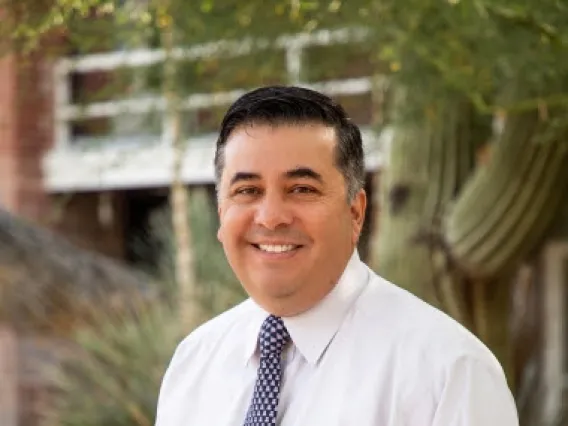Office of Native American Advancement & Tribal Engagement (NAATE)
Launched in September 2020, the office of Native American Advancement & Tribal Engagement’s (NAATE) goal is to increase Native American awareness and increase the health and well being of Native American students, faculty, staff and tribal nations. We recognize and acknowledge the contributions of Native Nations to the University of Arizona community and aim to create a physical space for the Center of Native American Advancement and Tribal Engagement and establish the School of Indigenous Governance and Nation Building. These initiatives will establish new processes and lead the university to becoming the leading institution serving Native Americans.
Message from the Special Advisor, Native American Advancement & Tribal Engagement

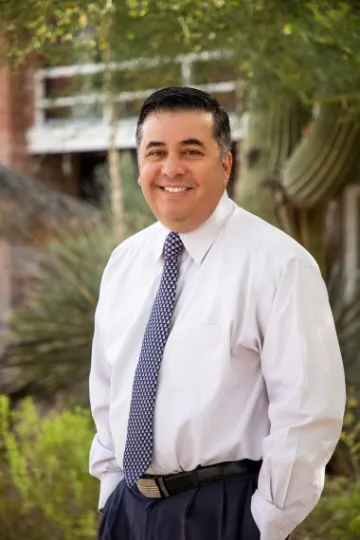
Hello Wildcat Country!
I welcome you to the University of Arizona and am grateful to serve you in my capacity as Special Advisor for Native American Advancement and Tribal Engagement. It does not get any better than that! I have a tremendous opportunity in front of me and look forward to continuing to serve the various Native Nations, Students, Faculty, and Staff in our advancement and engagement. Recently, we have started a new initiative of inviting Tribal Leaders to engage with Senior Leadership. This is just one of many steps that enable our story to be told and better yet understood. Our goal is to have the University of Arizona be the leading institution serving Native Americans.
Initiatives
Goals:
- To continue to have tribal leaders attend Senior Leadership Team Meetings
- To have President Robbins and/or members of his Senior Leadership Team engage with tribes on their homelands to collaborate on tribal goals and objectives
Completed Initiatives:
- Senior Leadership participated in Native Know-How Training that increased their knowledge and awareness of the 22 sovereign tribal nations in Arizona.
“Beyond providing valuable historical knowledge and contemporary guidance, the Native Know-How Workshop's exceptional facilitators offered firsthand perspectives about collaboration with tribal governments and community engagement that were particularly insightful.” – Craig Henderson, Vice President, Executive Office of the President
- Senior Leadership have welcomed and engaged with tribal leaders at monthly meetings.
“As a guest on this land, it has been such a gift to hear from tribal leaders during our senior leadership team meetings…to be guided by their words, wisdom, and community priorities.”- Marla Franco, Assistant Vice Provost, Hispanic-Serving Institution (HSI) Initiatives
- President Robbins met Chairman Miguel of the Ak-Chin Indian Community, as well tribal leaders and their Native University of Arizona students: Chairwoman Pencille of the Chemehuevi Indian Tribe, Chairwoman Flores of the Colorado River Indian Tribes, President Burnette of the Fort McDowell Yavapai Nation, and Chairman Nuvangyaoma of the Hopi Tribe.
Goal:
- To convene an Annual Arizona Tribal Leaders Summit during academic year 2021-22
Completed Initiatives:
- In November 2020, the University of Arizona hosted the Native Nations Flag Ceremony, where all 22 flags are permanently displayed in the Bookstore. Chairman Norris of the Tohono O’odham Nation and Chairman Yucupicio of the Pascua Yaqui Tribe attended in person. After the event, both Chairmen met with President Robbins.
- The University in partnership with The Tohono O’odham Nation and the Pascua Yaqui Tribe established a Land Acknowledge Statement.
Land Acknowledgement:
We respectfully acknowledge the University of Arizona is on the land and territories of Indigenous peoples. Today, Arizona is home to 22 federally-recognized tribes, with Tucson being home to the O’odham and the Yaqui. The University strives to build sustainable relationships with sovereign Native Nations and Indigenous communities through education offerings, partnerships, and community service.
The UA seeks to enhance support to Native American students engaged in distance/online learning. This initiative focuses on providing services to tribal citizens enrolled at the UA who need internet access, computer equipment, and other support so that they can actively participate in UA on-line courses; tribal citizens interested in enrolling in UA on-line undergraduate, graduate, professional degree, and certificate programs; and, tribal citizens interested in enrolling in on-line continuing education and workforce training programs offered by the UA or designed in partnership with the UA.
The University recently added to the Wildcat family through the opening of a new microcampus just south of main campus, serving the Pascua Yaqui Tribe. This location, the first microcampus serving a Native Nation, is the result of an initiative in the Arizona Advantage pillar of our strategic plan, and the first of what I hope will be many such locations.
Goal:
- To create a physical space for the Center for Native American Advancement & Tribal Engagement (Center) and establish a School of Indigenous Governance and Nation Building (School). The Center will be a cultural center for University of Arizona Native American students, faculty, staff, the wider University community, and Arizona’s tribal communities. The initiative will support the construction and/or renovation of a Native-designed physical space by launching a capital campaign for the Center for Native American Advancement Building Fund and School of Indigenous Governance Endowment Fund.
Completed Initiatives:
- Regents Professor Robert Williams, Faculty Co-Chair, Indigenous Peoples Law and Policy Program was instrumental in procuring a million dollars for the School of Indigenous Governance and UArizona has received another million dollar commitment with the establishment of the school. Space is limited on main campus, but NAATE continues to look for the opportunity to establish the Center and the School.
“The vision behind the creation of a first-of-its-kind School of Indigenous Governance and Development at the University of Arizona is to serve the nation-building aspirations and professional development needs of indigenous communities here in the United States and around the world. There’s a huge demand by both Indigenous and non-Indigenous leaders, practitioners, and students for first-class, advanced academic training and the University of Arizona has the faculty, expertise, research capacity, and already existing academic programs of recognized excellence in this field to comprehensively respond to this challenge on a global scale.”
Robert A. Williams, Jr., Regents Professor and Faculty Co-Chair
Contact Information
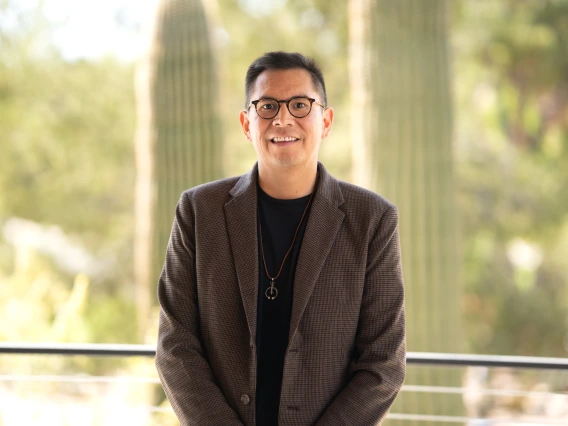
Byron Tsabetsaye
Tribal Engagement Liaison, Native American Advancement & Tribal Engagement
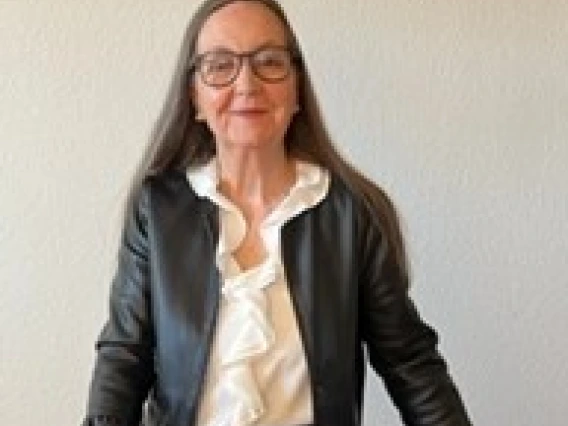
Bernadette Thomas
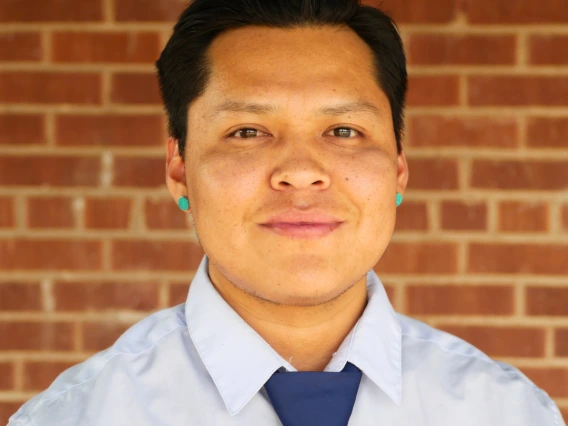
Nickolis Joe
Program Coordinator, Native American Advancement & Tribal Engagement/Initiatives
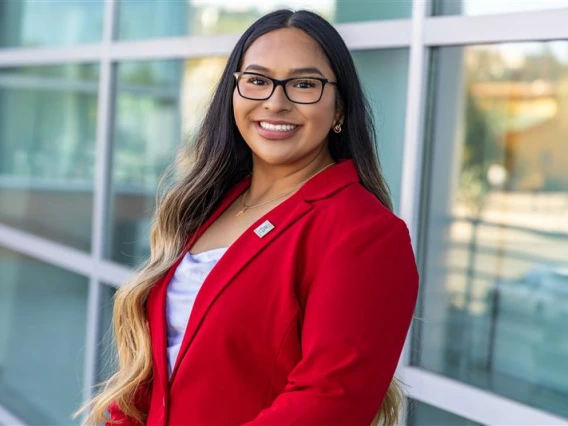
Tori Johnson
Student Marketing Intern, Native American Advancement & Tribal Engagement


